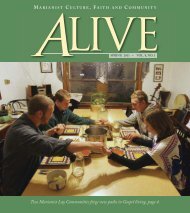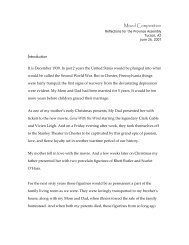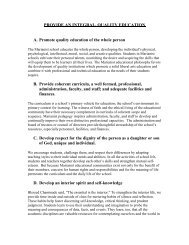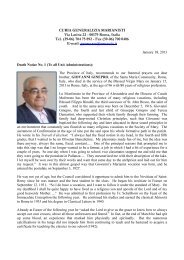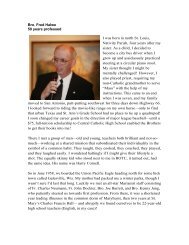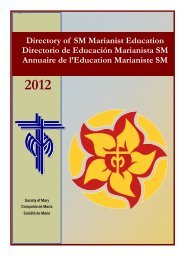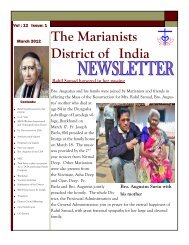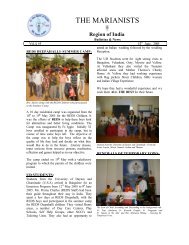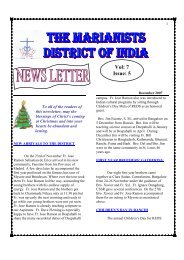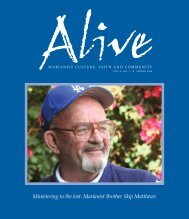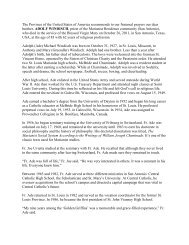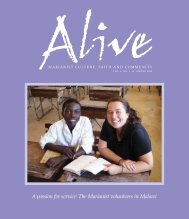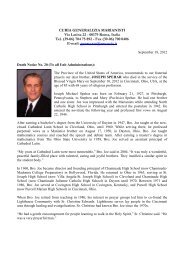Alive MARIANIST CULTURE, FAITH AND ... - The Marianists
Alive MARIANIST CULTURE, FAITH AND ... - The Marianists
Alive MARIANIST CULTURE, FAITH AND ... - The Marianists
Create successful ePaper yourself
Turn your PDF publications into a flip-book with our unique Google optimized e-Paper software.
Aspirant Brandon<br />
Alana-Maugaotega<br />
sounds a conch, a<br />
tradition from his<br />
Hawaiian-Samoan family.<br />
8 Call 1.800.348.4732<br />
Crossings community in<br />
Cincinnati and teaches at<br />
Purcell Marian High School.<br />
“I knew I didn’t want to be in a<br />
monastery. I wanted to be in<br />
an active community — such<br />
as the <strong>Marianists</strong> who are<br />
very apostolic — serving people<br />
in a variety of ways. That was<br />
exciting to me, particularly<br />
since I came from a teaching<br />
background, and I knew the<br />
<strong>Marianists</strong> were dedicated<br />
to education.”<br />
Community also was the<br />
main thing that attracted<br />
Brandon Alana-Maugaotega,<br />
a 24-year-old aspirant living in<br />
the Casa Maria community in<br />
San Antonio. “I’m Hawaiian-<br />
Samoan,” says Brandon, a<br />
graduate of Chaminade Uni -<br />
versity in Honolulu. “Family<br />
is very central to that culture.<br />
I knew if I was going to pursue<br />
religious life, I wanted to do it with a<br />
group of people and not by myself.”<br />
Although community was important<br />
to Brother Sean, he says he was drawn by<br />
the Marianist sense of practicality. ”<strong>The</strong><br />
<strong>Marianists</strong> have a very scholarly aspect<br />
but our feet are firmly grounded on the<br />
earth and that’s what attracted me.”<br />
While the welcoming<br />
nature of Marianist<br />
communities may initially<br />
attract would-be<br />
religious, men in formation<br />
say the charism<br />
— the desire to minister<br />
to the world while forsaking<br />
worldly values<br />
and the desire to deepen<br />
their faith by living<br />
in community — is<br />
what convinced them<br />
to take their vows.<br />
LIFE IN COMMUNITY<br />
For all its blessings,<br />
living in community<br />
presents many challenges,<br />
particularly for<br />
men accustomed to<br />
living on their own. As Brandon notes,<br />
“It’s a joy and a blessing and I love it,<br />
but there are things that come up in<br />
community. I live in a house with eight<br />
guys with eight ways of doing things<br />
and eight points of view.”<br />
While celibacy and the call to forsake<br />
a traditional family life may loom large for<br />
men entering the formation process, they<br />
soon discover greater challenges elsewhere.<br />
Because Marianist life is all about family,<br />
many of the new brothers say the true<br />
challenge isn’t in giving up a traditional<br />
family, but in learning to embrace community<br />
life and to consider the needs of the<br />
entire community when making decisions.<br />
“<strong>The</strong>re are times I miss my independence,”<br />
says Brother Sean. “But being able<br />
to come home and share the Eucharist<br />
with my brothers and sit down to the<br />
dinner table and share the day is very<br />
essential. It keeps people human. <strong>The</strong>re<br />
are joys and difficulties in living in community,<br />
but I think it’s better than living<br />
alone. When you’re surrounded by others,<br />
you learn your strengths and weaknesses<br />
and it helps you become a better person.”<br />
Marianist Father Oscar Vasquez, 43,<br />
agrees that putting the needs of the<br />
Second-year novice<br />
Bob Jones



